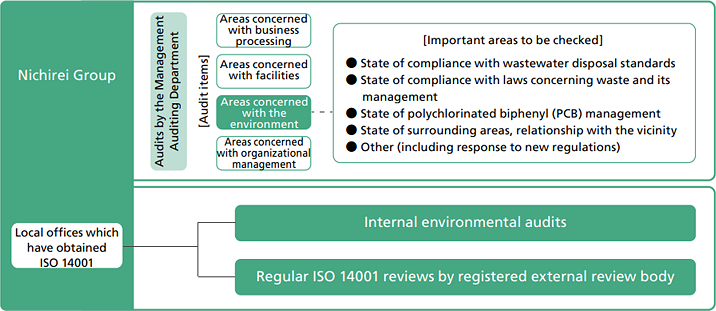The Nichirei Group formulated the Nichirei Group Environmental Policy under the following theme: “If the Nichirei Group is to pass on to future generations the natural abundance that is the source of food and good health and to continue providing freshness and good taste—together with its stakeholders, it must use its superior products and first-class logistics network to reduce the environmental impact of its business activities throughout the entire supply chain and help create a sustainable society.”
The Nichirei Group Environmental Policy focuses on three priority issues: climate change initiatives, promotion of sustainable recycling, and symbiosis with nature. For climate change initiatives, we recognize that food and logistics companies are greatly affected by climate change. We are implementing the following initiatives as part of our low-carbon policies.
The Nichirei Group, comprising a wide variety of different businesses, has established the Group Environmental Managers' Meeting, which is held approximately five times a year. This meeting aims to plan and promote effective environmental measures according to the business characteristics of each company. The initiatives of each company are reported at the Group Sustainability Committee, which meets more than three times a year. The Committee determines the environmental protection strategies and policies of the entire Group based on the content and progress of company initiatives and shares social trends on the environment. The chairperson of the Sustainability Committee is the representative director and president, and the committee includes the presidents of the operating companies and relevant executives as members.
●Sustainability Promotion Structure

| Number of meetings | Four (4) times |
|---|---|
| Main agenda items |
|
| Group Medium-term Environmental Plan Targets (FY2023‒FY2025) | |
|---|---|
| Rate of waste recycling at all sites | 99% |
| Reduction in CO₂ emissions (compared with FY2016; Scope 1 and 2 in Japan) | -33% |
| Rate of conversion to natural refrigerants Production equipment in Japan | 74% |
| Rate of conversion to natural refrigerants Logistics (Global) | 61% |
The reduction of CO₂ emissions refers to the target reduction of all emissions, and covers all energy consumed at worksites and by company-owned vehicles in Japan. The waste recycling rate continues to be maintained at 99% or higher. Food plants in Japan are also working to reduce residual animal and plant material. As for the conservation of water resources, as a food-related corporate group, Nichirei has formulated behavioral targets for using water efficiently and is promoting efforts toward achieving those targets so that the bounties of nature can be preserved for future generations. The entire Group is also engaged in collecting environmental data at its overseas worksites.
The scope of the Nichirei Group (in Japan), which accounts for more than 99% of the environmental impact, is tabulated.
The following company food plants and distribution centers are included in the calculations.
Nichirei Foods
Nichirei-Foods, Nichirei Ice, Churei, Kyurei, Nichirei Well Dinning
Nichirei Fresh
Fresh Maruichi, Nichirei Fresh Process, Nichirei Fresh Farm, Fresh Chicken Karumai, Fresh Meat Sakudaira
Nichirei Logistics Group
Logistics Network, NK Trans, Nichirei Logistics Hokkaido, Nichirei Logistics Tohoku, Nichirei Logistics Tokai, Nichirei Logistics Kansai, Nichirei Logistics Chushikoku, Nichirei Logistics Kyushu , Kyokurei
Nichirei Biosciences
Global Innovation Center
Other
Nichirei Corporation, Nichirei Aura, New Housing
●Nichirei Group CO₂ Emission Trends

As a material matter for the Nichirei Group, we have set a KPI for and are actively working to reduce the amount of and recycle the food residue and waste generated by our business activities.
●Nichirei Group Waste Discharged outside Worksites and Recycling Rate

The Nichirei Group grasps and manages its consumption of water and quality of its wastewater through regular monitoring in compliance with various food safety and environmental protection laws and regulations. At worksites in Japan, positive steps are being taken to conserve water. Going forward, the Group will examine the availability of necessary water resources at each regional base and how to assess the impact of risks.
In addition to covering areas such as organizational management and business processing, the Nichirei Management Auditing Department also does Group management audits of important areas, such as compliance with environment-related law and conservation activities. Worksites that have obtained ISO 14001 certification undergo internal environmental audits as well as yearly external reviews by a registered external review body.

| Name | Content |
|---|---|
| Sustainability Education | Aiming to ramping up sustainability management by implementing position-based study sessions and education & training programs for all revels of employees since FY2023. |
| Environmental e-learning | Held since FY2010 for all employees. Focuses on such pressing issues as prevention of global warming, resource recycling, and biodiversity. |
| Training for new employees | They are taught about the company's environmental policies and goals, and the connections between business and the environment. |
| Hands-on training on company land in Urabandai | Hands-on training for employees was held on company-owned land in the Urabandai region of Fukushima Prefecture between FY2014 and FY2017. There they help eliminate the Signal crayfish, a specified foreign organism, as well as go on hikes in forests surrounding company land. |
| Hands-on training to support the Cypripedium macranthos an endangered orchid, in the town of Fujimi, Nagano Prefecture | Nichirei has helped restore the endangered Cypripedium hotei atsumorianum—Fujimi, Nagano Prefecture's Cypripedium Restoration Conference—since they were established. The town of Fujimi conducted a hands-on environment-related training program for Nichirei employees that included activities for the protection of the Cypripedium macranthos. Participating in activities to protect the allows one to experience the difficulty of restoring the balance of nature once it has been destroyed. |
| Hands-on training (Biodiverse forests) | As part of the Good for lunches! Good for earth! Program which protects biodiverse forests, Nichirei Foods hold a hands-on nature training program for employees in forests it supports. |
In FY2025, there were no legal violations or environment-related incidents, fines and penalties that had a serious impact on the environment.